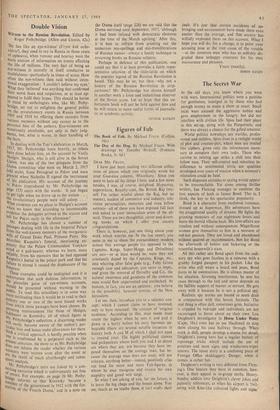Double Vision
Witness to the Russian Revolution. Edited by Roger Pethybridge. (Allen and Unwin, 42s.)
'HE lies like an eye-witness' (I/ryot kak oche- videtsI), they used to say in Russia in those years of upheaval, when rumour and hearsay were the
Main sources of information on events affecting the life of millions. The very fact of being an eyewitness is scarcely in itself conducive to
truthfulness—particularly in times of stress. How often the eye-witness then said without inten-
tional exaggeration: 'I couldn't believe my eyes.' What they `believed' was anything that confirmed their worst fears and suspicions, or at least ap- peared to fulfil their hopes. This should be borne in mind by anthologists who, like Mr. Pethy- bridge, set out to enlighten the general public on the revolutionary events in Russia between 1905 and 1918 by offering them excerpts from various memoirs without any caveat as to the personal bias of the authors. Eye-witnesses are notoriously unreliable, not only in their judg- ments, but, what is worse, in their handling of the facts.
In dealing with the Tsar's abdication in March, ,1917, Mr. Pethybridge leans heavily, as others have done before him, on the account by Vasily Shulgin. Shulgin, who is still alive in the Soviet Union, was one of the two delegates from the
buma committee who went on March 2, 1917 (old style), from Petrograd to Pskov and were Present when Nicholas II signed the instrument
of his abdication. His account of the journey to Pskov (reproduced by Mr. Pethybridge on Page 135) starts with the words: 'it just began '0 get light when we drove up to the station . . . the revolutionary people were still asleep. . .
What credence can we place in Shulgin's account when we know that according to incontestable evidence the delegates arrived •at the station and left for Pskov early in the afternoon? Mr. Pethybridge has chosen a number of from dealing with life in the Imperial Palace
Atom the well-known memoirs of the morganatic wife of Grand Duke Paul, Princess Paley. She describes Rasputin's funeral, mentioning ex- pressly that the Palace Commandant Voeykov acted as a pall-bearer, whereas we learn, more reliably, from his memoirs that he had opposed failure to attend it caused the displeasure of the Empress. These examples could be multiplied and it is unfortunate that such dubious information, in the e plausible guise of eye-witness accounts, Mould be presented without warning to the P„.11blic. To read this miscellany is in some way more misleading than it would be to read in their entirety one or two of the most biased works from which theSe passages have been chosen. By Perusing reminiscences like those of Shulgin, s3 ,,.1,khanov or Kerensky, all of which figure In Pethybridge's collection, a discerning reader will , easily become aware of the author's s par- ntUar bias and hence make allowances for them. such critical approach is hardly possible when 's confronted by a potpourri such as the P,resent selection, the more so as Mr. Pethybridge does not inform the reader whether the various
are were written soon after the event or ke the result of much afterthought and subse- quent analysis. Mr. Pethybridge's texts are linked by a con-
necting narrative which is unfortunately not free of L.errors. For example, on page 26 Mr. Pethy- bridge informs us that Kerensky 'became a member of the government in 1912 with the for- mation of the Fourth Duma,' and in a note on
the Duma itself (page 228) we are told that the Duma survived until September, 1917, `although it had been infused with democratic elements at the time of the March uprising.' After this, it is best to refrain from pointing out the numerous mis-spellings and mis-transliterations of Russian names—always a handy technique in reviewing books on Russian subjects.
Perhaps in defence of this publication, one could say that it at least provides a fairly repre- sentative selection of the tittle-tattle on which the popular legend of the Russian Revolution is based. This may be so; but then—why not a history of the Russian Revolution in strip- cartoons? Mr. Pethybridge has shown himself in another work a keen and industrious observer of the Soviet scene. Let us" hope that this un- fortunate book will not be held against him and he will return to more useful forms of journalis- tic or academic activity.
GEORGE KATKOV


































 Previous page
Previous page